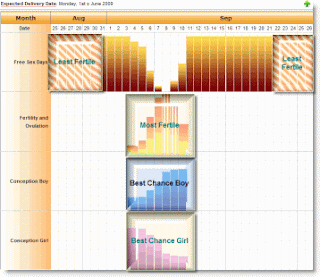
You can increase your chances of having a boy or a girl by having intercourse on certain days. If you have intercourse three days before you begin ovulating, your chances are better of having a girl. This is because the sperm carrying female X-chromosomes live longer and swim slower than male Y-chromosome carrying sperm.
You can prevent an unwanted pregnancy by making sure you don't have unprotected intercourse while you are ovulating.

To use the ovulation calculator on the next page, first click on select.
Once you do that, the ovulation calendar will come up displaying the current month.
If your period was in the prior month, simply navigate through the ovulation calender using the arrow keys.
Once you find your selected day, click on it, and the calendar will close.
You also have the option to adjust your cycle. You can adjust it to anywhere from 21-37 days. Once you have your cycle length adjusted accordingly, click on calculate. The next screen will tell you when you will be ovulating next, and when you're the most fertile.
Remember, having intercourse when you are ovulating, and also on your peak fertile day increase your chances of becoming pregnant. Also, please note that these results can be affected by your cycle regularity, as well as many other factors. Use this ovulation calculator as a basic guideline.
For a simplified version, with just the basic details (without boy or girl calculations), use the calculator below :
Basic Ovulation Calculator and Calendar
There are also physical signs you can look for. One is a change in cervical mucus. A few days before ovulation, cervical mucus will often become more plentiful and clearer. It commonly will have an appearance similar to egg whites.
You also may experience some discomfort or cramping on one side of your lower abdomen. Some women observe slight spotting when they ovulate, while others feel nauseous or have a slight upset stomach upset.
Each woman's body is different, charting your fertility is a great way to get to know your cycle and your body.











